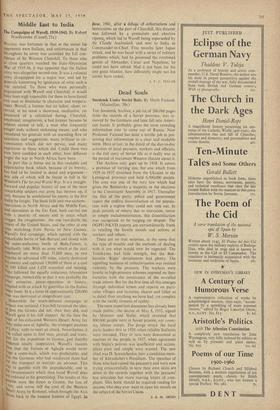Middle East to India
The Campaigns of Wavell, 1939-1943. By Robert Woollcombe. (Cassell, 21s.)
WA\ LLL was fortunate in that at the outset his opponents were Italians, and unfortunate in that Ihroughout he never was accorded the full con- lidence of Sir Winston Churchill. To those who at close quarters watched the Italo-Abyssinian War of 1935-36, it was apparent that the 'Italian army was altogether second-rate. It was a colonial army ill-equipped• for a major war, and led by generals hamstrung by ignorance of what such ‘a war entailed. To those who were personally acquainted with Wavell and Churchill, it would have been nigh impossible for them to have found two men so dissimilar in character and tempera- ment. Wavell, a listener but no talker, silent, re- served, in no sense a showman, meditative, yet Possessed of a calculated daring. Churchill, emotional, imaginative, a bad listener because he seldom ceased to talk, a man who frequently sought ends without reckoning means, and who inundated his generals with an unending flow of questions and suggestions, many brilliant in cir- cumstances whiCh did not persist, and many capricious in those which did. Could these two men have confided in each other, how different flight the war in North Africa have been.
In part this is borne out in this readable and appreciative book which, because of its brevity, has had td be limited in detail and argument— one side of which will be found in full in Sir Winston's The Second World War. It is a straight- forward and popular history of one of the most remarkable soldiers our army has thrown up, if only because he annihilated his enemy in the first battle he fought. The book falls into two sections:
' operations in North Africa and the Middle East, and operations in the Far East, both carried out With a paucity of means and in areas which stagger the imagination : the one two-thirds the extent of the United States, and the other at one lime stretching from Persia to New Guinea. Wavell's first campaign, which opened with the remarkable battle of Sidi-Barrani and closed with the super-audacious battle of Beda-Fomm, is excellently told. With an army which at the start numbered no more than 31,000 men, in two his he advanced 650 miles, utterly destroyed "is enemy and captured 130,000 of them at a cost i„4 500 killed and 1,428 wounded and missing. 'Next followed the equally audacious Abyssinian campaign, remarkable in that it was probably the 'host extensive pincer-operation in history, coupled with an attack by guerrillas on the Italian inner front. In it a force of approximately 220,000 'nen was destroyed at insignificant cost.
Meanwhile the much-debated campaign in Cireece was initiated. Churchill favoured the idea;
at first the Greeks did not, then they did, and head gave it his full support. At the time the 'ad of his exhausted Western Desert Army lay
forty miles cast of Agheila, 'the strongest position 1,1 Libya,' unfit to meet an attack. Nevertheless, it "41 called upon to find men, aircraft and trans- Ilurt for the expedition to Greece, and thereby tendered totally inoperative. Wavell's reasons
:'ere that the Italians at Agheila would never
that a come-back, which was predictable: and i `lit the Germans who had reinforced them had '10t, the transport to warrant an advance. This ,is to gamble with the unpredictable, and in `tIne circumstances which then faced Wavell does °I redound to his generalship. The results of this tamble were the fiasco in Greece, the loss of rele, and worse still the rout of the Western Desert Army by Rommel, which brought the Axis forces back to the western frontier of Egypt. In June, 1941, after a deluge of exhortations and instructions on the part of Churchill, this disaster was followed by a premature and abortive riposte, which led to Wavell being superseded by Sir Claude Auchinleck and sent to India as Commander-in-Chief. Five months later Japan struck, and he was faced with a series of military problems which, had he possessed the combined genius of Alexander, Caesar and Napoleon, he could not have solved. Had it not been for his one great blunder, how differently might not his career have ended.
3. F. C. MUER


































 Previous page
Previous page